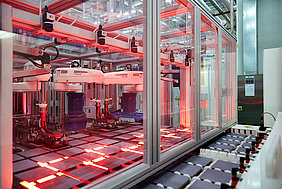
Clean energy for Europe
The European Union (EU) targets climate neutrality by 2050 in a scenario whereby renewable energy plays a central role. On the European level, there is an urgent need to increase the efficiency of the entire renewable energy value chain and integrate sustainability throughout it. PEPPERONI, a new R&I project co-funded by the EU under Horizon Europe and supported by the Swiss State Secretariat for Education, Research and Innovation (SERI), will significantly contribute towards reaching these targets.
Harnessing solar technologies to enable European manufacturing
PEPPERONI aims to set up a pilot line to develop solar modules with perovskite/silicon (Si) tandem technology. Funding will total approximately €14.5 million over four years, with the consortium covering the full value chain of PV innovation. The most widely established solar cell technologies to date are made with silicon, and silicon PV is now one of the cheapest means of electricity production in many parts of the world. The solar industry’s success in recent years has pushed the industry towards the current practical limits of efficiency for silicon technology. To exceed the limits of single-material cells, scientists have proposed to add one complementary solar cell to form so-called “tandem” solar cells.
PEPPERONI has selected technology that promises the best ratio of performance over manufacturing costs – silicon/perovskite tandem. Perovskite, a novel class material with a special crystal structure, can be fine-tuned to take advantage of the parts of the solar spectrum that typical silicon PV materials cannot utilise very efficiently, meaning they make excellent hybrid-tandem partners. PEPPERONI will 'spice up' industrial silicon cells with a perovskite top cell. This tandem design benefits from the industrial expertise of silicon PV and extends the range of attainable power conversion efficiency (PCE) beyond the practical limits of silicon.
Increasing the PCE of solar cells is important for two reasons. In the long run, it is the most effective way to reduce the levelised cost of electricity (LCOE). And in the short term, it is the best way to promote photovoltaics for applications where space is limited e.g., rooftops, facades, or vehicles.
Within PEPPERONI, a pilot line for the development of industrial-type tandem cells and modules will be established at the Qcells European headquarters in Thalheim, Germany, and will feature innovative equipment, processes and materials to produce high-efficiency tandem cells and modules The project aims to scale up the active area of perovskite/Si tandems from the 1cm2 of today’s record devices to industry-relevant dimensions. PEPPERONI’s approach promises a fast and cost-competitive route to mass-production of PV modules of high performance and long durability.
Fabian Fertig, Director Global R&D Wafer & Cells at Qcells, said: “Qcells is proud to be part of the PEPPERONI consortium with its world-class technology partners. This research promises to break new ground in the advancement of perovskite-silicon tandem solar cell and module technology. At a time of unprecedented pressures on the current energy system, it is exciting to realise this first and transformative step towards industrial-scale manufacturing of next-generation PV technology in Europe.”